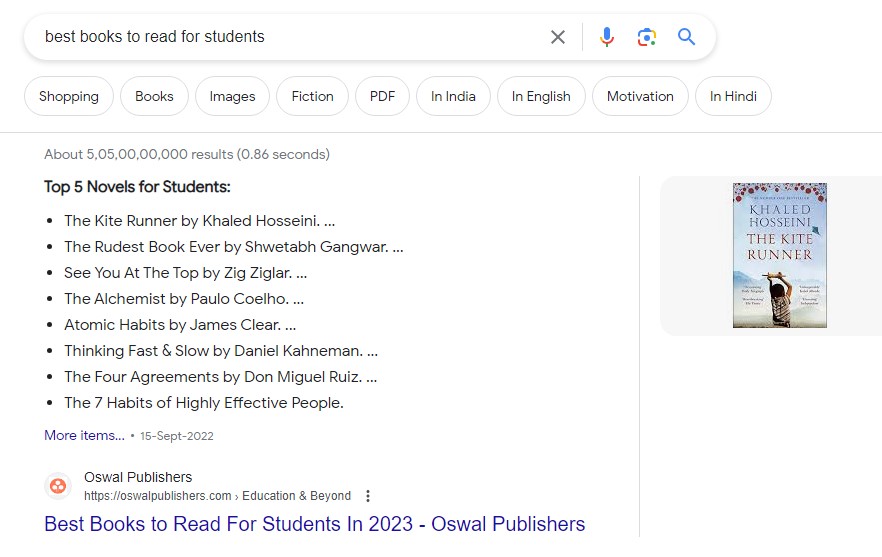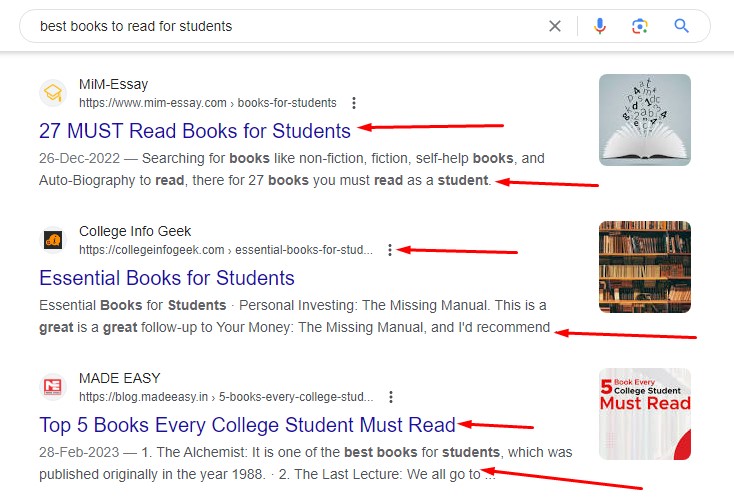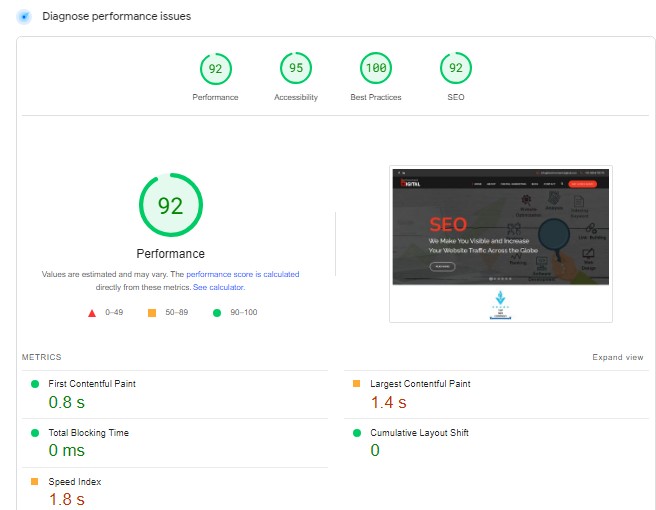1. Selecting the Right Keywords for Your Content
Keyword research forms the foundation of successful SEO. Identify relevant keywords and phrases that align with your target audience’s search intent. It starts with the research and identification of Primary and Secondary keywords that are relevant to your content.

Primary keywords are the main focus of your content. For each page, select one primary keyword that accurately represents the theme of your page, your brand, products, or services.
Secondary keywords provide additional support and cover specific subtopics within your content. You can have multiple secondary keywords for an article, but make sure they relate naturally to the main topic. Avoid forcing secondary keywords if they don’t fit seamlessly.
To discover suitable primary and secondary keywords, take advantage of helpful tools like the Google Ads Keywords Planner tool. It simplifies the process of finding keywords that align with your content and target audience.
2. The Impact of Originality: Writing Quality Content
By providing compelling and authentic content, you increase the likelihood of your audience discovering your website and returning to it. Original content allows you to demonstrate your expertise in a particular subject, serving as the starting point for the user’s journey. When users encounter unique and meaningful content, they are more inclined to revisit your webpage and seek out additional related content. Moreover, search engines, particularly Google, value originality and are more likely to recognize and promote content that stands out.
Cover all possible aspects of a topic. Establish yourself as a trusted authority in your domain by offering in-depth coverage of the topic.
Moreover, it is crucial to develop content that maintains its value over an extended period. Whether you refer to it as evergreen or timeless content, the key is that it remains relevant and continues to attract traffic over time, irrespective of the passage of time. Inbound marketing is a valuable strategy that consistently generates results even when your attention is diverted elsewhere. When creating enduring content, consider topics that provide lasting value to your readers without the need for frequent updates.
3. Optimize Your Content for Search Engines & Capture Featured Snippets
Understand the inquiries and interests of your audience to create impactful written content. This understanding is crucial for capturing your audience’s attention and delivering content that resonates with them. A valuable strategy to accomplish this is by directing your efforts towards acquiring featured snippets.

Featured snippets are prominently displayed at the top of Google’s search results page, offering direct answers to users’ questions without the need for them to navigate away. These snippets are highly visible, informative, and have a greater chance of attracting organic traffic as they are showcased before the numbered search results.
Securing these highly sought-after positions is a paramount goal for SEO professionals. To achieve this, it is imperative to optimize your content with a focus on targeting and capturing these positions.
4. Craft Engaging Page Titles and Meta Descriptions

The page title and meta description serve as the initial impression for your audience. These concise snippets have the potential to sway users’ decision to click or skip your page. With such influential power contained within a few words, it is crucial to ensure that they leave a lasting impact. Don’t worry about the complexity of editing your 犀利士 fting-effective-meta-descriptions-to-boost-your-seo/” title=””>page titles and meta descriptions. Most platforms offer user-friendly methods to accomplish this task seamlessly.
We have listed out some of the important pointers:
- Make a list of the primary and secondary keywords
- Include your target keywords strategically
- Ensure that page title falls within the 30-to-60-character range
- Meta description should be concise and within the range, that’s under 160 characters.
- Your content should effectively convey the purpose and objectives of the page, highlighting its unique qualities and the value it offers to the audience. It is essential for readers to understand the benefits they will gain from engaging with the content.
- The title and meta description for each page should be unique.
Want to know more about Meta Descriptions, read our blog <name of the blog with hyperlink>
5. Acquire Valuable Backlinks from High-Authority Websites
Backlinks, also known as external links that direct traffic to your website, play a pivotal role in search engine rankings. When reputable sources link to your site, it enhances your website’s authority and boosts your long-term SEO performance and this practice is called link building.
However, identifying the right sources for backlinks may seem daunting and to simplify this we can analyze the backlinks of your competitors. Compare your existing backlink profile with that of your competitors, uncovering new opportunities for acquiring quality backlinks.
There are different ways to generate quality backlinks. We have listed a few of them:
- Provide Guest Posts: Extend your influence by offering to write guest posts for others, especially if you have captivating infographics or other valuable content to offer.
- Engage Publishers: Take the initiative to reach out to publishers and pitch them your original research or data that you have compiled for your on-site content. This can help you garner wider coverage and establish credibility.
- Leverage Industry Directories: Enhance your visibility by getting listed in relevant industry directories. Consider joining professional industry associations, utilizing local citation services, participating in networking groups, or becoming a part of business organizations to strengthen your credibility within the industry.
- Build Relationships with Media Outlets: Cultivate relationships with journalists and media outlets relevant to your industry. Offer expert insights, unique stories, or data-driven content that can attract media coverage and generate valuable backlinks to your website.
- Encourage User-generated Content: Foster a community around your brand and encourage users to generate content related to your products or services. This can include testimonials, reviews, case studies, or user-generated articles. User-generated content not only provides valuable social proof but also generates organic backlinks and increases engagement.
6. Optimize Page Loading Speed for Better User Experience and SEO
The speed at which your web pages load not only influences user experience but also impacts your website’s search engine optimization (SEO). When a page takes too long to load, users are more likely to leave, resulting in a higher bounce rate. Additionally, page loading time is one of the crucial factors considered by search engines when ranking websites. To assess and improve your page speed performance, you can utilize the free SEO tool called Google PageSpeed Insights. It provides a score ranging from zero to 100, with higher scores indicating faster page loading speeds for both desktop and mobile devices.

In the event that your webpage takes longer than desired to load, it is essential to investigate the elements that could potentially be causing the delay. Take a closer look at your page and identify any components that might be negatively impacting its loading time. For instance, consider whether there are any unnecessary plugins integrated into your page. If so, removing them can significantly enhance the speed at which your page loads. By optimizing the elements contributing to slow loading, you can improve the overall performance and efficiency of your webpage.
7. Boost Website Navigation and Credibility with Effective Linking
Strategic use of internal and external links can greatly enhance your website’s crawlability, user experience, and credibility. Internal links guide users to other pages within your site, aiding search engines in indexing your content and encouraging visitors to explore further. For example, linking related blog posts enables users to access more information on a specific topic without leaving your site.
External links, on the other hand, direct users to external websites with high-quality, authoritative content relevant to your subject. Ensure you evaluate external links to maintain credibility and avoid linking to low-quality sources. By incorporating a balanced mix of internal and external links, you can improve navigation, provide valuable resources, and establish your website as a trusted information hub.
8. Regular Website Audits for Ongoing Optimization
Performing regular website audits is essential to ensure the continued functionality and user-friendliness of your site. It serves as a valuable opportunity to identify and address any potential issues that may have been overlooked, such as broken links, orphaned pages, or slow load times. By conducting thorough audits, you can proactively resolve these issues before they have a significant impact on your website’s performance.
Regular website audits offer valuable insights into the health and optimization of your site, enabling you to enhance overall performance and provide an optimal user experience.
9. Gain Insights from Competitor Analysis
In a competitive landscape where you and your rivals share similar content and target similar audiences, studying your competitors can provide valuable insights. By analyzing their websites, you can uncover effective content strategies, discover new content ideas, and stay ahead of the game. You can do this by utilizing certain tools.
The Traffic Analytics tool offers valuable information on your competitors’ website traffic, including the volume of traffic they receive, their primary traffic sources, and the channels through which they attract visitors, such as paid advertising or social media.
Utilize the Organic Research tool to gain an overview of your competitors’ organic search performance, allowing you to identify their top-performing pages and understand their strategies for ranking in search engine results.
Furthermore, leverage the power of the Keyword Gap tool to identify keywords that your competitors are ranking for, but you may be missing out on. This insight helps you refine your keyword strategy and discover untapped opportunities to improve your organic search visibility.
By thoroughly studying your competitors and utilizing these tools, you can enhance your content creation, optimize your website’s performance, and strengthen your competitive advantage in the digital landscape.
10. Optimize Your URLs for Improved SEO
Optimizing your URL structure is a simple yet effective way to enhance your on-page SEO. By crafting short and descriptive URLs, you can have a significant impact on your website’s visibility in search engine results and provide a more user-friendly experience.
When constructing your URLs, aim for conciseness and clarity. Avoid long, convoluted URLs that can confuse both search engines and users. Instead, opt for URLs that succinctly describe the content of your page and make it easy for search engines to understand the topic at a glance.
A clean URL structure not only helps search engines better index and rank your pages but also improves the user experience. When users encounter clear and concise URLs in the search engine results pages (SERPs), they are more likely to click on your link and trust the relevance of your content.
Remember to include relevant keywords in your URLs, as this can further reinforce the topic and relevance of your page. However, be cautious not to overstuff keywords or create spammy-looking URLs, as this can negatively impact your SEO efforts.
By implementing short, descriptive URLs, you can optimize your website’s on-page SEO and improve your chances of attracting organic traffic and higher rankings in search engine results.
In Conclusion
Ensuring the success of your website requires a solid understanding of SEO. Whether you’re a beginner or an expert, mastering SEO is an ongoing journey of learning, experimentation, and innovation. By implementing the tips provided, you can achieve the desired results and dominate the search engine results pages (SERPs).
If you’re uncertain about where to begin, our Site Audit tool is a valuable resource. It can assess the health of your website and assist you in prioritizing crucial updates that will positively impact your SEO performance.
Remember, SEO is not a one-time effort but a continuous process. Stay proactive, stay informed, and adapt your strategies as the SEO landscape evolves. With dedication and the right tools at your disposal, you can conquer the SERPs and drive the success of your website.

